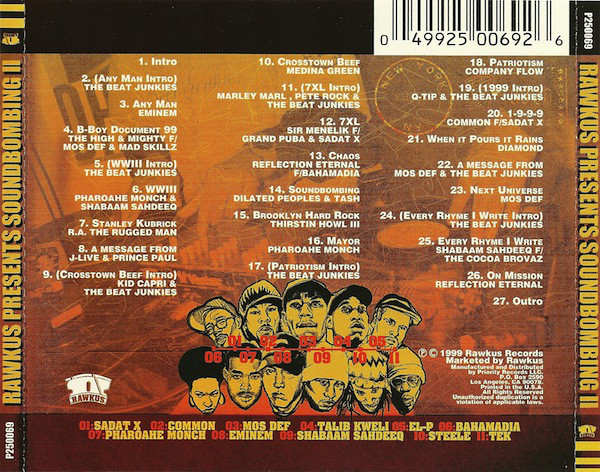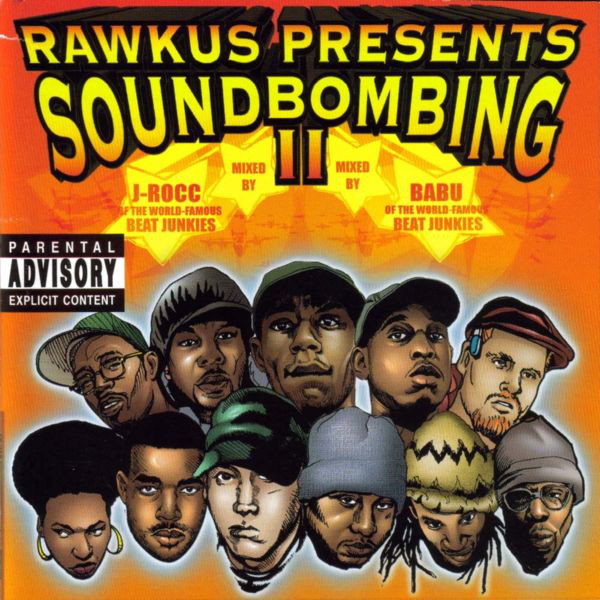Back in the late 90s when I was in high school, I recall one of my classmates introduced me to a website called “undergroundhiphop.com” (or UGHH) with some interesting musicians. He was particularly taken with horrorcore artists Necro and Cage. Personally, I came to enjoy more artists from the Rawkus Records roster.
“Underground hip-hop” is a type of umbrella term that encompasses hip-hop music that has not quite found the mainstream media and radio. In the 90s, that circle typically manifested itself at local cyphers where youths expressed their creativity in spoken word, dance, and art (graffiti). Many mainstream artists you know and love today started within these small-time local avenues. Rawkus Records was a popular independent type label that gave many underground artists a larger platform.
Rawkus Records released the compilation album Soundbombing II in 1999 and it has aged impressively well. I daresay use the term “flawless” with the album in reference to the mixing as well as the talent/content. Several of these featured underground artists grew to achieve both critical and market success, namely Mos Def (aka Yasiin Bey), Talib Kweli, Common, and most notably, Eminem.
The album is mixed, meaning each track flows into the following in a seamless fashion. This paints the album like its telling a story. The album was mixed by the production collective Beat Junkies. Every track feels like it has its place based on how the record was organized.

The record “B-Boy Document 99” caught my attention as I was looking for tracks to break dance to back in that timeframe. For awareness, “b-boying” is a term that describes not only a break dancer, but a follower of all facets of hip-hop in general being the music, art/graffiti, dance, and rapping/emceeing all enveloped in a single term. It did grow into a synonym for “break dancer” before the culture started to dissipate in general. This was likely furthered by the fact that the term came from “break boy” referencing the guys who danced during the “breaks” in between where emcees rap on hip-hop records.
Many of these artists remained underground, which is fine considering the underground hip hop culture was less about popular appeal and more about the art that is hip-hop and the creativity it influences. That is why if you listen to the album, the lyrics are really the substance of each track with the production only to further accentuate the words. That’s what actually makes it even sweeter when these previously underground artists do achieve mainstream recognition such as with the aforementioned Talib Kweli, Mos Def, Common, and Eminem. I also believe this may have been a common occurrence with many NYC rappers around that timeframe.
I could go on at length about not only many tracks on this album alone, but the impact of the artists that were discovered with the tracks. Company Flow introduced me to El-P, another technical emcee who is currently in the group RTJ (Run The Jewels) with Killer Mike. Both Mos Def and Talib Kweli (collaboratively known as Black Star) went on to achieve mainstream success in following years with solo efforts. Eminem and Common experienced minor success prior to the mixtape, which only flourished thereafter.
Pharoahe Monch is a complex rapper from Queens who I actually idolized a bit back in high school. He was very technical and used extensive vocabulary and creativity with his rhymes. It’s always refreshing to hear artists use the English language to its full extent with clever wordplay.
Over twenty years later, this particular compilation mix has certainly stood the test of time. I’m grateful for having been introduced to it, broadening my background with hip-hop culture as a whole.
I haven’t been able to tap into the modern “underground hip-hop” network but I am certainly curious as to what type of talent is brewing there for our future mainstream consumption. The aforementioned website “undergroundhiphop.com” was decommissioned several years back. Also, with the popularity of streaming outlets like Spotify, Apple Music, and Youtube, many “underground” artists see fame through the viral means of one catchy single. You don’t even need record deals anymore to enjoy “mainstream fame.” Record labels can find viral hits and simply swallow up the artist with record contracts after the fact to try and cash in on the wave. It’s a new world.
